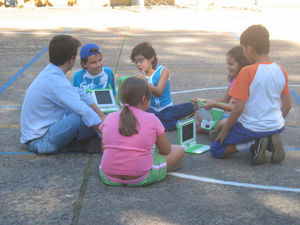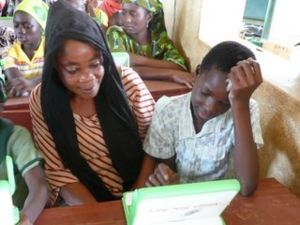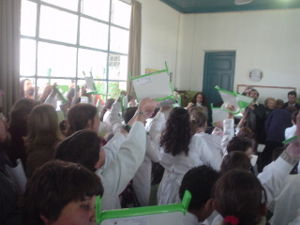Educators
Welcome
One Laptop per Child is an education project, not a laptop project. While much of our effort over the last few years has been devoted to bringing the XO laptop into existence, the laptop is simply a means to an end-- a revolution in how we educate the world's children. Our goal is to provide children around the world with new opportunities to explore, experiment, and express themselves.
Already, hundreds of laptops have been distributed to children in pilot schools around the world. This summer, the final "B4" beta-test laptop will go out to another thousand children. The first official production run is estimated to be in the millions, and will increase from there. It's an exciting time to get involved with OLPC. This page is designed to help you get started.
Highlights
| OLPC Brazil | OLPC Nigeria | OLPC Uruguay | OLPC Thailand |
File:Hiking02.jpg Ben Samkha is a rural village in northern Thailand |
"Pupils go even beyond what I can teach in the class. It's a very interesting thing to use. I personally have a better idea about teaching... We discovered that giving them time to discover something and to do it in their own way, they feel more happy and they are so excited in using it that, 'Yes, I discovered it! Yes, I can get it!! Yes, I can do this on my own!!!' Teaching is getting more interesting and less stressful." — Mr. O., Galadima School, Abuja, Nigeria
Vision
The XO laptop will bring a world of new ideas, images, and materials to children around the world. It will also provide students and teachers with new ways to collaborate, create, and transform works over time. Our belief in collaboration as a fundamental part of learning underscores our commitment to editable document formats, revision tracking, and careful attribution of authors and sources.
All of our projects are collaborative, and this wiki is where each project takes shape. If you take a look around, you'll find projects in all stages of completion-- from rough outlines and meeting notes to detailed workplans and polished documents. Feel free to contribute your ideas and expertise to any project that interests you. We're counting on you to make OLPC succeed.
Visit Content to read more about our model for content creation, our network of content curators, and our plan for school servers that will host (and share) each school's digital library.
Community
The purpose of this community is to support teachers who are using XOs in their classrooms, and to involve educators of various backgrounds who are interested in contributing to the OLPC project.
Haven't been here before?
- Create an account on the OLPCWiki!
- Add yourself, or your organization to the educator Roll Call page.
- New to wiki editing? Here's a good tutorial to help you get started.
What should I do first?
- Read about the OLPC Learning Vision to learn more about why we think children in developing countries need laptops and what we think laptops will enable them to do.
- Read some of the comments from teachers and students involved with OLPC.
- Learn about our current pilot programs in Nigeria and Thailand, visit the OLPC Ceibal blog, and explore the wiki pages created by OLPC Brazil.
- Familiarize yourself with our ideas about content and collaboration and the various Creative Commons licenses. As a rule, we want educational materials produced for and connected with OLPC to be free and open source.
And then what?
Start to contribute! (See below).
Contribute
Join the community
- Add an educator user box to your user page.
- Create an educational organization page for your organization, group, or school.
- Find a project.
Contribute content
- Read about the content repository that will reside on the school servers.
- Add to the list of ideas for content that should be included in the repository.
- Contribute your content directly to OLPC by following these instructions.
Create activities
- Read the educational activity guidelines to learn about the features of the XO that pertain directly to educators.
- Contribute to our collection of story-based learning activities.
- Create a new activity, either with an activity template or entirely from scratch.
Frequently Asked Questions
Ask a question and someone will try to answer it.
Comments and Discussion
Please leave comments on the Educators talk page.


